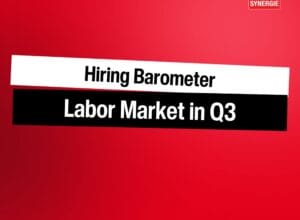4 Key Changes in the Slovak Labor Code: Are You Ready for Them?


The year 2025 brings significant changes to the Slovak Labor Code, affecting both employers and employees. These amendments respond to current labor market trends, emphasizing flexibility in employment relationships, support for families, and promotion of sports activities. What exactly is changing, and how can you prepare effectively?
Flexibility as the Main Pillar of Change
The Slovak government has approved amendments to the Labor Code, effective January 2025. These innovative updates aim to modernize the work environment and adapt it to the current labor market needs. What are the specific changes?
- New Mandatory Contribution for Children’s Sports Activities
From January 2025, a new mandatory contribution for children’s sports activities will be introduced for employers with more than 49 employees. Employees with uninterrupted employment of at least 24 months will be entitled to a contribution amounting to 55% of eligible expenses, up to a maximum of €275 per calendar year for all their children combined. For part-time employees, the maximum amount is proportionally reduced.
The contribution applies to employees’ children up to 18 years old (or if they turn 18 during the calendar year for which the contribution is provided). To qualify, the child must also have been a member of a Slovak-registered sports organization for at least six months.
This contribution covers costs associated with the child’s active sports activities, such as membership fees, training costs, or competition participation. The goal is to encourage children’s engagement in sports.
- New Rules for Recreational Vouchers
From January 2025, significant changes will apply to the system of recreational vouchers. Employees will now have the option to transfer the voucher to their parents. This means the employee does not need to participate in the recreation personally. Parents can also bring their spouses, provided they are married. The contribution remains 55% of eligible expenses, with a maximum of €275 per year. Eligible expenses include accommodation, meals, and other recreation-related services.
- Adjustments for Seasonal Work
The amendments introduce significant changes to agreements on work activities for seasonal jobs, a specific form of employment relationship introduced in 2023. These agreements are limited to a maximum of 520 hours per calendar year and apply strictly to defined seasonal activities.
Employees working under these agreements benefit from reduced social contributions, lowering employer costs. However, such agreements must not bypass minimum wage entitlements or basic working conditions.
The most substantial changes affect the tourism sector, where conditions are significantly simplified. Previously, jobs in restaurants, hospitality, and accommodation facilities had to be directly tied to specific tourist activities (e.g., cable car or water transport operations). From January 2025, this condition will no longer apply, simplifying the employment of seasonal workers across the entire hospitality and accommodation sector.
Seasonal work remains defined as activities dependent on changing seasons, recurring annually, and lasting no more than eight months within a calendar year.
In tourism, this includes:
- Passenger transport on waterways,
- Rental of recreational and sports equipment,
- Operation of camps and artificial water bodies,
- Cable cars and ski lifts,
- Newly, also restaurants, hospitality, and accommodation facilities without specific conditions.
These changes eliminate prior ambiguities and aim to streamline seasonal employment in tourism. Employers will benefit from increased flexibility and reduced administrative burdens.
- Wage Protection in Subcontracting Relationships
A notable addition, effective from August 1, 2024, is subcontractor liability under the Labor Code. This change, prompted by European Commission critiques, introduces a new provision significantly strengthening employees’ wage payment security in the construction sector.
Employees can now demand unpaid wages directly from the contractor if their employer (subcontractor) fails to pay them on time. This right applies exclusively to construction work, as explicitly defined by law.
The covered activities include construction, repair, and maintenance of buildings, including excavation and groundwork, assembly and disassembly of prefabricated parts, interior and installation works, as well as renovation, demolition, and routine maintenance such as painting and cleaning.
Key details:
- The wage claim against the contractor is limited to the minimum wage applicable during the work period, calculated per hour worked.
- If the employer pays part of the wage, the claim is proportionally reduced.
- The contractor pays the wage in net terms, without deductions. Employees must settle tax and insurance obligations individually.
- Claims must be made in writing within six months of the wage’s due date.
This new right applies only to legal relationships established after August 1, 2024.
How to Prepare for the Amendments?
To implement these changes successfully:
- Conduct a comprehensive audit of existing employment contracts and update them as necessary.
- Set up systems to manage and track contributions for sports and recreation.
- Revise internal policies related to seasonal work and working hours.
- Implement systems for electronic communication.
- Train HR teams and managers on the new obligations.
- Allocate budgets for the new mandatory contributions.
SYNERGIE: Your Partner for a Smooth Transition
The changes in the Labor Code don’t create obstacles—they present opportunities for optimizing employment relationships. Need help preparing for these changes or seeking flexible HR solutions?
Contact us. As experts in labor law and HR consulting, we can help you turn these changes into your competitive advantage.








